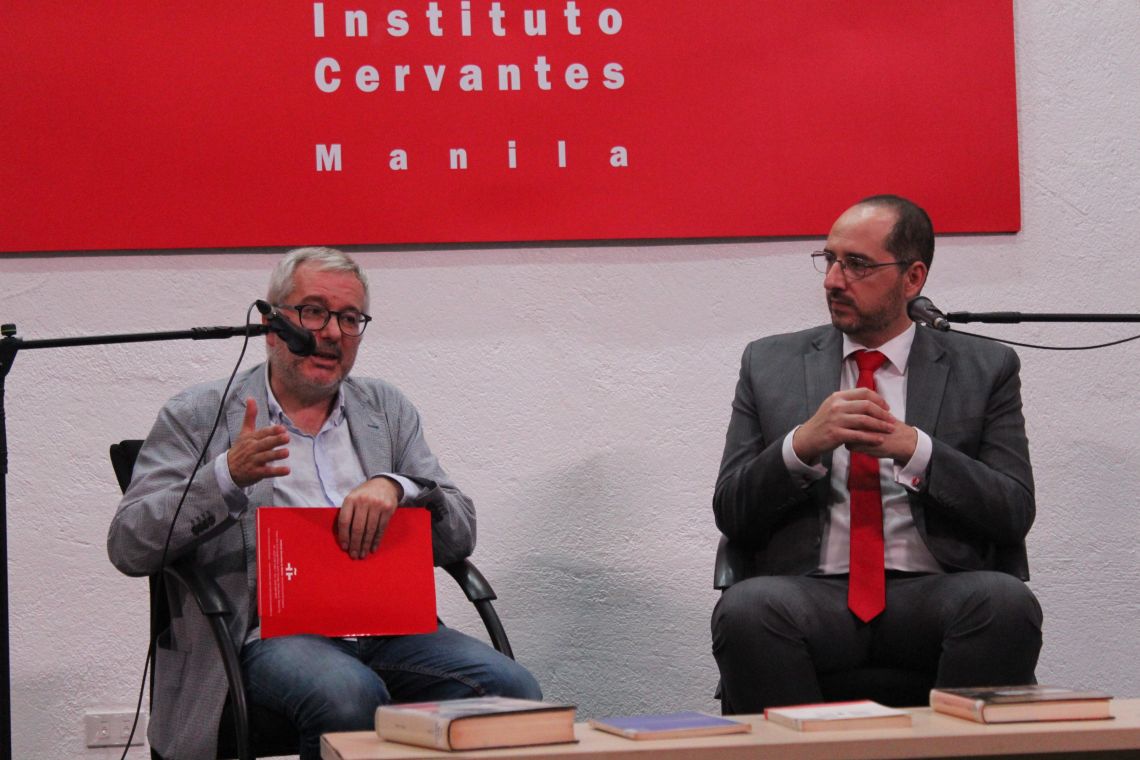
Visiting Spanish journalist Alfonso Armada speaks about journalism, literature and truth at the Instituto Cervantes. Looking on is Carlos Madrid Alvarez-Piner, director of Instituto Cervantes.
Visiting Spanish journalist Alfonso Armada cautioned journalists against too much dependence on technology to the point of becoming blind to the complexities and vibrancy of the situation on the ground and failing in their duty of informing the public of the truth.
In his talk on journalism, literature, and the truth for the ‘Encounters in Literature’ program of the Instituto Cervantes, November 6, Armada said, “Because of the internet, we can know almost everything about everything. But the reality is that, with so many people talking at the same time, I have the impression that we are more lost than before.”
Armada said with data overload, the audiences find it difficult to discern which are facts and which are fiction and which journalists and institutions to trust.
People then result to selective reading, where they only choose to read and watch what they are interested in, or what agrees with their views, he said, which leads to the “thinning of one’s view of the world.”
In the Internet, he said, “there is less serendipity,” pertaining to the instance of discovering a story by accident that one doesn’t know would actually interest him or her.
Armada is concerned that today’s journalists and readers are failing to make enough time to read, watch, and understand what is really going on in the society.
“We live in a complex world; we, as journalists, need time to understand what is going on in the world. […] If we want to be really informed, we need to devote time to reading long stories in different media,” said Armada who has worked for various news organizations, among them are Spanish newspaper El País and the American Broadcasting Company.
He emphasized the importance for a journalist to make time in immersing himself to the conditions of the people he is writing about.
To be able to convince people about his view of reality, Armada said that one should “work on the ground, taking your time asking the people, taking notes, going back to the places, trying to recreate with a lot of precision, a lot of beauty about reality.”
Armada, who is also into writing poetry and plays, journalists can write news reports without eliminating creativity and color—features which are more familiar in works of literature than in journalism.
He cited as an example Svetlana Alexievich, a Belarusian journalist who won the Nobel Prize for Literature in 2015 not because of her journalistic works but because of the books she had written on various issues and events, like the Soviet War and the Chernobyl Nuclear Disaster.
Alexievich, Armada said, was able to create works of literature without being unfaithful to the truth and to reality by using in her works the anecdotes she got from interviews she conducted with people who experienced the events first-hand.
“Use the richness of a language in order to make a perfect or, as much as possible, a deep and colorful and vivid recreation of reality–but taking care that everything you’re telling to the reader is the truth, putting nothing from yourself in order to improve the picture of reality,” he further said.
At the same time, he stressed the equal responsibility of readers in devoting a significant fraction of their time, if they would want to better understand the complexity of the issues and happenings before them.
This does not only involve making time to read or watch longer media content, but also giving an extra effort in learning facts that are not necessarily in jive with their own convictions.
“You need a very concerned population in order to check and to see different views in order to make their own view of reality,” Armada said.
Armada is currently serving as the president of the Spanish section of Reporters without Borders, an independent international organization focused on monitoring, promoting, and defending the freedom of information and of the press.